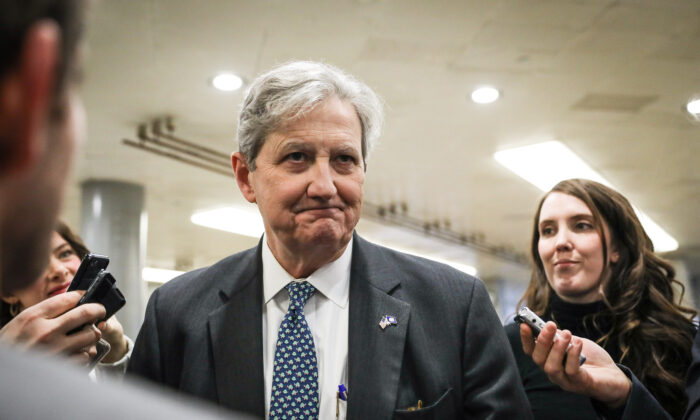
Sen. John Kennedy (R-La.) arrives at the Capitol in Washington on Jan. 27, 2020. (Charlotte Cuthbertson/The Epoch Times) Politics
By Masooma Haq April 6, 2021 Updated: April 6, 2021 biggersmallerPrint
Senator John Kennedy (R-La.) says that the Biden infrastructure bill proposed by Democrats is actually a welfare and reparations bill that follows the agenda of the progressive Green New Deal, rather than infrastructure.
“This is a Green New Deal, welfare, and reparations bill. Being charitable, less than 10 percent of the bill is devoted to infrastructure and we don’t even know what the projects are, you know who picks and projects? Speaker Pelosi, Senator Schumer, and President Biden,” Kennedy told Fox News on Tuesday.
“Now one need not be clairvoyant to see that their projects are going to end up in New York and California and blue states,” said Kennedy. “So, there you have it—you’ve got a political slush fund.”
Kennedy also criticized the bill’s massive price tag, urging Democrats to make an effort to get GOP input.
“Now, will they work with us? I hope so, I hope they do. I will do old-man backflips if they’ll work with us, but I don’t have my hopes up.”
The Green New Deal Kennedy referred to was introduced by Rep. Alexandria Ocasio-Cortez (D-N.Y.) with the main objective being to achieve economic and racial justice in the United States.
Her 2019 resolution states, “clean air and water, healthy food, access to nature, a sustainable environment, and the promotion of justice and equity by stopping oppression of ‘indigenous peoples, communities of color, migrant communities, deindustrialized communities, depopulated rural communities, the poor, low-income workers, women, the elderly, the unhoused, people with disabilities, and youth” are the priorities of the bill.
The Deal also aims “to achieve net-zero greenhouse gas emissions through a fair and just transition for all communities and workers.”
Although Biden’s infrastructure plan would spend less on each item, it will nonetheless fund many of the Green New Deal’s objectives like non-fossil fuel energy, transportation, childcare, agriculture, housing, schools, broadband, water supply, and land protection.
Some of the proposals in Biden’s infrastructure package that don’t have an estimated price tag, but are part of the Green New Deal agenda, include calling on Congress to:
- Tackle long-term unemployment and underemployment through a new subsidized jobs program.
- Eliminate sub-minimum wage provisions in section 14(c) of the Fair Labor Standards Act and expand access to competitive, integrated employment opportunities and fair wages for workers with disabilities.
- Ensure all workers have a free and fair choice to join a union by passing the Protecting the Right to Organize (PRO) Act and guarantee union and bargaining rights for public service workers.
- Tie federal investments in clean energy and infrastructure to prevailing wages and require transportation investments to meet existing transit labor protections.
- Provide the federal government with the tools it needs to ensure employers are providing workers with good jobs—including jobs with fair and equal pay, safe and healthy workplaces, and workplaces free from racial, gender, and other forms of discrimination and harassment.
- Take immediate steps to spur the construction and rehabilitation of homes for underserved communities.
- Pass the Neighborhood Homes Investment Act, which calls for the creation of a new federal tax credit that will produce new equity investment dollars for the development and renovation of 1-4 family housing in distressed urban, suburban, and rural neighborhoods.
- Quadruple support for the Manufacturing Extensions Partnership—increasing the involvement of minority-owned and rurally-located small-and-medium-sized enterprises in technological advancement.
- Ensure that new jobs created in clean energy, manufacturing, and infrastructure are open and accessible to women and people of color.
- Invest in job training for formerly incarcerated individuals and in improving public safety.







